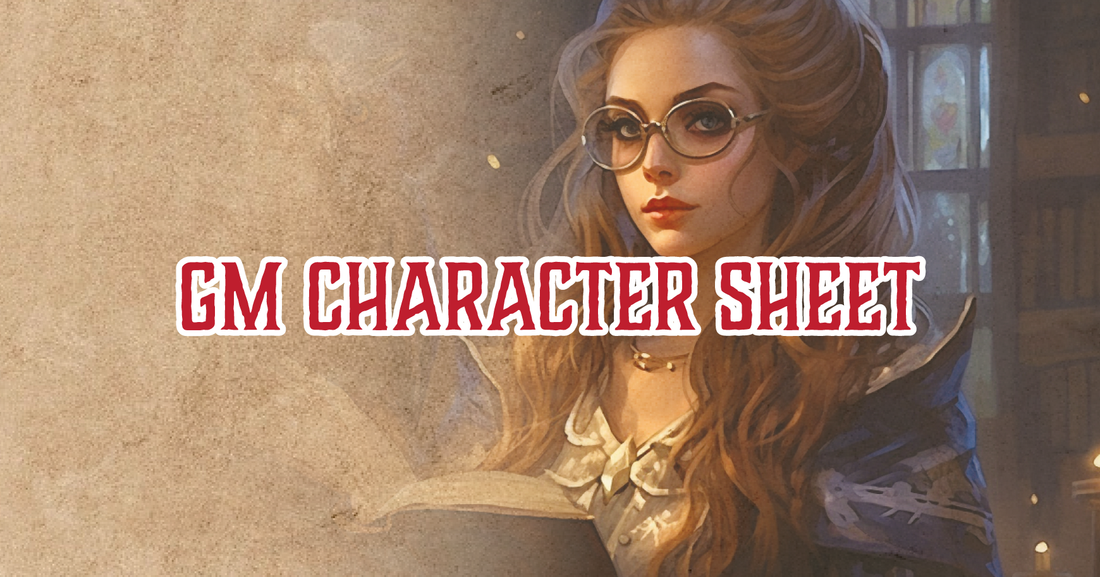Us dungeon masters, game masters, story tellers, entertainers, and hosts nurture entire worlds in our little heads. We work hard to build fun and immersive experiences for our players. Then when that session has finally come and gone, those post-session blues start to set in.
Maybe you're a little too critical of yourself, or maybe you tend to burn yourself out quickly. Both of those sometimes apply to me. I love being a DM, but I sometimes forget that I am always growing and improving.
So I created a secret character sheet just for myself. After every session I grade myself, give myself new abilities, and track my progress. I get excited to fill out my sheet and level up!
Here's how it works...
Print out this sheet and add it to your binder. Write your name and favorite snacks/drinks. You can't forget your munchies. They are your GM fuel.
HP
As fun as leading a session is, it expends energy. Think of these as combat encounters for your players. Even if they survive, they will eventually need a long rest. This is important to prevent burnout.
So add an appropriate amount of boxes to represent consecutive sessions. Once you've filled them up, take a break. Take a week off. Maybe let one of your players run a one shot.
I added 6 to mine. That might be too much for you or too little. But me realistic with it.
XP
You have 30 XP slots. After each session you will earn XP from grading your ability scores. Once you reach 30 points, you level up! Celebrate! Adjust your stats, add some abilities, add a point to the class you think you improved in the most.
Class
There are many types of GMs. It's important to understand your strengths and play to them. Pick up to 4 classes and add a "1" beside it.
I'm definitely a Bard. I love drama. My campaigns MUST have emotional stories. I have Spotify playlists for all of my campaigns and I even purchased soundtracks and SFX to really bring out my players emotions.
However, I'm a techy too. I use lots of tools and FX to enhance the experience of my VTT. So I also placed a 1 beside Artificer. I also craft huge homebrew worlds with history and lore, so Druid. Lastly, I love a good horror. I use inspiration from horror movies like The Ritual and modules like Into The Wyrd and Wild. So I added a 1 beside Warlock.
Ability scores
This is where you grade yourself after every session. Rate yourself on a 1-3. Note, there is no 0 or negative numbers. Keep it simple. You are always improving. Be nice to yourself.
Here's my scale:
- It could have been better. Opportunity to improve.
- Great! I enjoyed it and I got some good reactions from my players.
- It went really well! Best I've felt about a session in a while.
You can adjust as needed, but be nice to yourself. Don't punish yourself.
As for the meanings of the abilities, you can define them however you choose. Here's how I define them:
Combat & encounters: Every session should have some kind of encounter like a puzzle, challenge, or combat. Was the encounter engaging, fun, and relevant to my players?
Storytelling: Was my delivery easy to follow? Did I set the scene well enough for my players to interact with? Did I leave space for my players to build?
Improv: Did I "yes, and..."? Did I recover quickly when the session derailed? Did I enable my players to build their own adventure?
Player Engagement: Inevitably, everyone gets distracted. But did I hold their attention for the most part? Did they interact with the encounters?
Player Retention: Did my players remember what happened last session? Do they know why they are fighting a giant lizard monster? (Kinda hard to read this sometimes. But if the players need reminders often, it could be a sign they need help here. If players can easily roleplay in the setting, then they probably retained the info surrounding it.)
Fun: Did you have fun? Did the players laugh? I sometimes forget that DnD is supposed to be funny. You players should smile, laugh, cry, and get excited. You should too!
After each session grade each block and total the result. Then add the total to your XP.
Inspiration
This is for those great sessions that make your players say "f*ck yeah!" or "no way!" or something hilarious happens. Give yourself inspiration! You can replace the grade of any block with a 3 next session.
Abilities
I learn a new trick that works with my players every session. Or maybe I see a cool idea on YouTube. Over time, I learn new tools that I can then use in my sessions. It helps if I have them written down.
These are methods I've caught myself doing that work on my players. For example, I learned to respond to a player's dangerous requests with "You can certainly try," and it allows me to express the risk without limiting them.
Use this list as your tool chest of tricks. Add to the list as you learn new ones. Review the list every time you level up and check if you learned any new ones. Print out 2 of these sheets if you need.
Spells
Creating maps, NPCs, dungeons and encounters are all part of being a GM. However, doing it too much can easily burn you out. So you should limit yourself.
Think of the things that expend your decision making skills and place them here. Prepping for a session, making a World Anvil article, or painting a mini... these all consume spell slots. You need a long rest!
That's it!
Don't take my rules as law. Homebrew it you need. Scratch out stuff and write your own. Whatever helps you track your progress and prevents you from burning yourself out.
Thanks!

